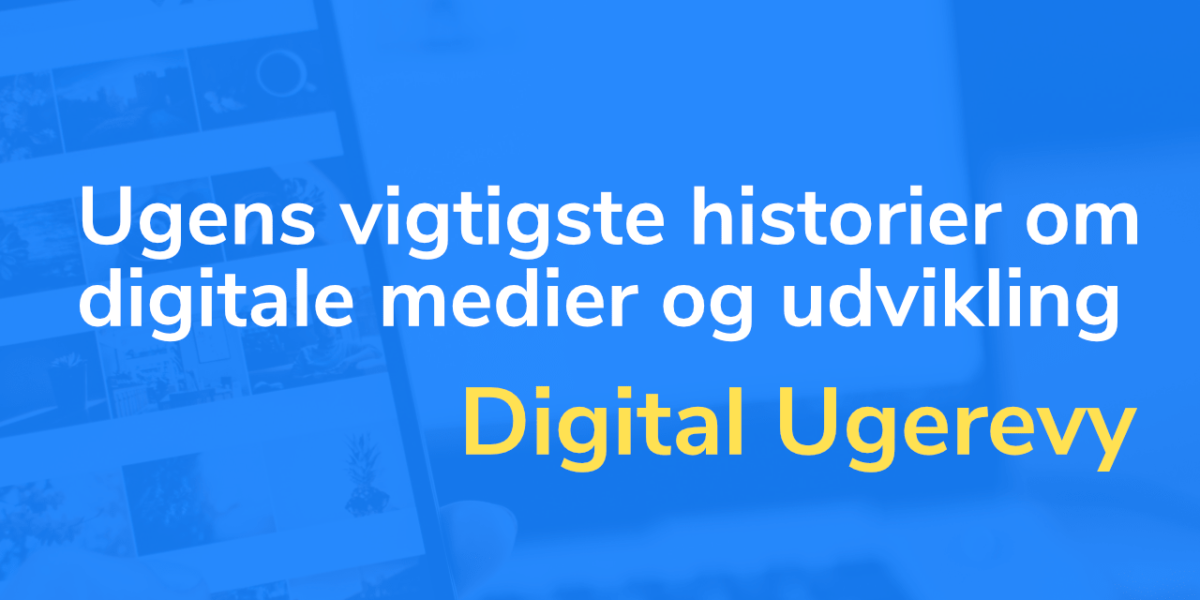Digital Ugerevy #5 (2020)

Her har du Danmarks mest komplette opdatering på sociale medier og digital udvikling i mediebranchen. Du bliver holdt opdateret og sparer masser af tid.
[toc]
? Sociale medier

Her finder du historier om eller fra de store sociale platforme, der har en enorm rolle at spille i kontakten mellem udgiver/afsender og modtager.
Her er reglerne for Facebooks "oversight board"
Nieman Lab:
"Over the past two years, Facebook has been trying to fulfil that promise, designing what it calls an Oversight Board, and this week the company announced the bylaws or rules that the board will operate under, as well as its first staff member."
Casey Newton / The Interface:
"The oversight on Facebook's Oversight Board"
Facebook henter News-strateg fra Fox News
Byers Market / NBC:
"Facebook has tapped former Fox News executive producer Jennifer Williams to head video strategy for Facebook News, the dedicated news tab that will launch wide later this year, a source familiar with the move who was not authorized to speak publicly tells us."
Du kan du begrænse datadelingen med Facebook-annoncørerne
MediaWatch:
"Facebook-brugere i Norden skal have mere hånd i hanke med, hvilke data der ligger til grund for de annoncer, som brugerne præsenteres for på det sociale medier. Til formålet har Facebook udviklet et værktøj [Off-Facebook Activity], der nu rammer nordiske brugere, oplyser selskabet i en meddelelse."
The Next Web:
"How to use Facebook’s ‘Off-Facebook Activity’ tool"
Facebooks forskelsbehandling af politikere er okay
MediaWatch:
"Det sociale medie har loven på sin side, når selskabet har valgt at gøre forskel på grænserne for politikeres ytringer på platformen sammenholdt med almindelige brugere, vurderer professor og specialist i medieret."
Facebook i milliardforlig om ansigtsgenkendelse
MediaWatch:
"Facebook har lukket en sag om ansigtskendelse med et forlig, hvor selskabet betaler 550 mio. dollars, svarende til 3,7 mia. kr. Det skriver en række amerikanske medier herunder Wall Street Journal."
Facebook bruger mindre på originalt indhold
The Information:
"Facebook continues to increase its programming budget for Watch—it will rise to around $1.4 billion this year, from the company’s initial $1 billion budget in 2017, according to a person familiar with the matter. But within that amount, it is spending less on costly originals and more on talk shows and licensing clips from TV networks and sports leagues."
Facebook faldt 300 mia. kr. i værdi
MediaWatch:
"Nedturen kommer, efter at Facebooks regnskab for fjerde kvartal ifølge Reuters afslørede den laveste kvartalsmæssige vækst nogensinde for verdens største sociale medie."
The Interface / Casey Newton:
"Facebook's trust problem isn't about being understood"
For nogle medier er Facebook Watch bedre end YouTube
Digiday:
"You’re able to grow audiences much faster on Facebook [...] It’s all about shareability [there], and if people share your videos on Facebook, that chain can just multiply. On YouTube, you’re very reliant on the platform to suggest your videos."
ESPN ruller 500 live-shows ud via bl.a. YouTube og Facebook
Digiday:
"These shows are different than the shows we do on TV [...] If you think about what we did leading into college football, the social shows are often very relaxed. I put [an all-] capital ‘fun’ in front of the tone we want to see. They’re about driving interest and enjoyment around it."
YouTube
Måske er det YouTubes algoritmer, der radikaliserer
Sådan er det med forskning: Der er sjældent klare svar. Og det gælder også indenfor teknologi. "Måske er det ikke YouTubes algoritme, der radikaliserer", kunne du læser i Ugerevyen fra uge 43. Nu skriver TechCrunch så:
TechCrunch:
"The findings suggest a pipeline effect over a number of years where users who started out commenting on alt-lite/IDW YouTube content shifted to commenting on extreme far-right content on the platform over time."
Kritik: YouTube beskytter annoncører, men ikke brugere, fra indhold
Quartz:
"'I’m extremely disturbed,' Nandini Jammi, co-founder of Sleeping Giants, which campaigns to stop companies advertising on unethical websites. 'They have multiple standards. It’s like they’re two-timing their users. Content not safe for brands is likely not safe for users either.'"
Kongressen kræver handling ifm. klimamisinformation på YouTube
CNBC:
"The U.S. House Select Committee on the Climate Crisis wrote a letter addressed to Alphabet CEO Sundar Pichai, requesting the company take action against climate disinformation — specifically on its video platform, YouTube."
Læs artiklen
De andre + branchen generelt
Tech-firmaer slås med coronavirusrygter
Version2:
"[...] med Corona-virussens hurtige spredning ser tre af de største tech-virksomheder det som en nødvendighed at prøve på at standse spredningen af 'fake news' og forkerte sundhedsinformationer"
The Washington Post:
"Facebook, Google and Twitter scramble to stop misinformation about coronavirus"
Corona-virus gør det svært for Kina at styre sociale medier
The New York Times:
"The contrast is almost never so stark in China. The government usually keeps a tight grip on what is said, seen and heard about it. But the sheer amount of criticism — and the often clever ways in which critics dodge censors, such as by referring to Xi Jinping, China’s top leader, as “Trump” or by comparing the outbreak to the Chernobyl catastrophe — have made it difficult for Beijing to control the message."
Nu kan amerikanerne anmelde tweets, der vil påvirke valghandlingen
Nieman Lab:
"Tweets that seek to suppress turnout or mislead voters violate Twitter’s rules and, for the first time, users can flag tweets using the same drop-down menu previously available for reporting abusive material or spam."
Sådan måler du effekten af influencer-kampagne på TikTok
Forbes:
"I have decided to list the most important metrics that each brand and company should look at to analyze during and at the end of an influencer campaign on TikTok. Please note that this article will only talk about organic influencer marketing campaigns and not paid media or display ads activities, and for this reason, you will not see any reference to PPC or direct CPI/CPA."
Vine-stifter lancerer... en ny Vine
Marketing Land:
"Byte, the long-awaited follow-up to Vine, launched in a surprise announcement Friday evening. The app is available in the app store for iOS and Android devices, positioning itself as a 6‑second “looping video app” from Vine co-founder Dom Hoffman."
? Digitale medietendenser

Her kan du læse nogle af ugens tendenser indenfor medier. Det kan være en ny metode eller tilgang, branchen forsøger at tage til sig.
Medier bruger tredjeparts-cookies til mange ting
Digiday:
"After Google announced this month it will phase out the use of third-party cookies in Chrome, many focused first on the impact this would have on ad targeting. But the third-party cookie has long been a workhorse in digital media, used for a host of ho-hum yet critical functions, including user profiling and audience analytics."
Læs mere fra Digiday om tredjeparts-cookiens død:
29. januar:
"A key web standards group will help decide what comes after the third-party cookie"
21. januar:
"Publishers and marketers are mostly absent from key group deciding what comes after the third-party cookie"
Flipboard går ind i lokalnyheder
TechCrunch:
"Flipboard, the personalized news aggregation app used by 145 million users per month, is today launching a new feature aimed at bringing local news coverage to 23 cities across the U.S. and Canada, including major metros like New York, LA, San Francisco, Seattle, D.C., Boston, Dallas, Chicago and many others."
iPad fylder 10 år
Wired:
"The iPad wouldn’t ultimately fulfill all of these hyperbolic promises, but over the past decade, it has ushered in a new, more intimate kind of personal computing experience—and has arrived at the point where it can at least be considered as a possible laptop replacement. Below, WIRED tracks the evolution of the iPad."
The Verge / Processor:
"The iPad is still finding its place ten years in"
"Tim Cook er vigtigere end EU"
Digiday:
"‘Tim Cook is more important than the EU’: Browser makers hold more power over the digital ad industry than regulators"
The Washington Post slipper afsted med clickbaits — sådan gør de
Columbia Journalism Review
"But, more than any of the others, the Post has pulled off theneat trick of combining prestige journalism with a shadow clickbait factory that puts out a steady flow of fast-turnaround, aggregated stories grasping at virality. (“An orphaned boy moved into his grandparents’ home. The homeowners association wants to kick him out.”) And it’s done so without losing its storied reputation. "
Sådan gennemgik Quartz lækkede dokumenter med AI
Qartz:
"ICIJ partnered with Quartz’s AI Studio to find a solution. We built a system using artificial intelligence to “read” all the documents and help journalists from Quartz, ICIJ and other partner organizations find the kinds of documents they expected in the cache of leaks—regardless of file format, spelling, transcription errors, phrasing, or even the language of the document."
Hvad er en god mediepodcast?
Journalism.co.uk:
"If you survive, you learn to do it better and we will probably end up with the system where you have trusted podcasts the same way you have trusted publishers."
Hvorfor er der ikke flere, der bruger AMP for Email?
Marketing Land:
"This could potentially change the entire email conversion funnel by putting the conversion right in the body of the email. Why aren’t more brands doing it then?"
? Business

Her kan du læse nogle af ugens historier og tendenser indenfor forretningsudvikling i mediebranchen. Altså det, der handler om at tjene penge.
Annoncer betyder mindre for JP/Pol-omsætning
MediaWatch:
""Jeg skal ikke lægge skjul på, at vi med en vis betryggelse konstaterer, at annonceomsætningens andel af vores samlede omsætning nu kun er en fjerdedel. Det gør alt andet lige, at hvis der skulle komme en lavkonjunktur, eller hvis det strukturelle konkurrencepres på annoncemarkedet skulle stige, så er vi meget mindre følsomme over for det, end vi har været tidligere. Hvis du går bare 5–10 år tilbage, så var det jo halvdelen af omsætningen, der kom fra annoncer," siger Stig Ørskov."
TV 2 vokser 100 mio. på digital omsætning
MediaWatch:
"Den digitale del af TV 2's omsætning voksede sidste år med over 100 mio. kr. sidste år, oplyser TV 2 i en pressemeddelelse.
Tv-selskabet ønsker ikke at oplyse, hvor stor den digitale omsætning samlet set blev. "
Læs medier uden annoncer med Scroll
The Verge:
"A new subscription service called Scroll is offering ad-free access to hundreds of websites — not by blocking the ads, but by working with an expanding group of publishers to take the ads down in exchange for a slice of the subscription fee.
Scroll launches today with support for a number of major websites and networks, including The Atlantic, BuzzFeed News, G/O Media (which includes websites like Gizmodo and Kotaku), and Vox Media, which — important disclosure here — includes The Verge."
Læs også:
Nieman Lab:
"Scroll promises a better Internet for users and more money for publishers, all for just five bucks"
What's new In Publishing:
"'News industry’s most significant attempt to address a real problem': How Scroll can supplement publisher revenues with a better user experience"
Claes Holtzmann, der er data- og analyseredaktør hos Jysk Fynske Medier, har tweetet lidt om økonomien i Scroll:
The Guardian siger nej til annoncer fra fossile firmaer
The Guardian:
"The Guardian will no longer accept advertising from oil and gas companies, becoming the first major global news organisation to institute an outright ban on taking money from companies that extract fossil fuels."
Quartz henter abonnenter via video
Digiday:
"Twenty-five percent of last year’s membership acquisitions can be attributed to videos; that share is second only to the percentage credited to the in-depth field guides produced by Quartz’s reporter on emerging hot-button topics like cannabis or blockchain, a spokesperson said."
Hvad blev der af andenpartsdata?
Medie:
"Som navnet antyder, er andenpartsdata overordnet set data "indsamlet af anden part" – eksempelvis et mediehus. For det pågældende mediehus optræder det altså som førstepartsdata, men når det af en annoncør eller et bureau bliver brugt til annoncering på mediets domæner, vil det for annoncøren være andenpartsdata – fordi bureauet og annoncøren ikke selv ejer, indsamler og har adgang til det."
Det lyder lidt som denne Digiday-artikel, jeg havde med i Ugerevyen fra uge 47 sidste år:
"Second-party data is essentially just first-party data owned by another company, such as a publisher."
? Udvikling og tech

Her får du et kig på nogle af ugens historier indenfor den digitale udvikling og teknologi, der enten direkte eller indirekte kan have betydning for medier/udgivere.
Ritzau udvikler robot til auto-tagging
MediaWatch:
"En ny robot skal gøre det muligt at personificere brugerflader, pulje historier inden for samme emne og forstå, hvad der får brugerne til at betale for et abonnement. Potentialet er stort, mener digital udviklingschef på Børsen, der er med som én af 12 partnere. JP/Politikens Hus står udenfor og barsler med eget projekt."
Ritzaus projekt er ikke det første forsøg på automatisk tagging i mediebranchen. Læs også:
Medieblogger:
Endnu et forsøg på auto-tagging i #dkmedier
Hvorfor er Google Assistant så meget bedre til forskellige sprog?
VentureBeat:
"So why has Google Assistant pulled so far ahead? Naturally, some of the techniques underpinning Google’s natural language processing (NLP) remain closely guarded trade secrets. But the Mountain View company’s publicly available research sheds some — albeit not much — light on why rivals like Amazon and Apple have yet to match its linguistic prowess."
Google: Vores chatbot er verdens bedste
MIT Technology Review:
"Meena was trained on a whopping 341 gigabytes of public social-media chatter—8.5 times as much data as OpenAI’s GPT‑2. Google says Meena can talk about pretty much anything, and can even make up (bad) jokes."
Google arbejder på ny app til virksomheder, der skal samle trådene
The Information:
"The new mobile app, which is currently being tested internally at Google, also includes Hangouts Meet, Google’s video conferencing app and Hangouts Chat, a real-time message app, according to the people."
Nu kan du søge i datasæt med Google
Computerworld:
"Efter en beta-periode har Google nu trykket på knappen og officielt lanceret selskabets nyeste søgemaskine Dataset Search. Indtil videre har Google indekseret næste 25 millioner dataset, som folk kan slå sig løs i."
Mere statistik på app-downloads
I Ugerevyen fra uge 4 kan du læse om App Annies rapport. I denne omgang er det en ny rapport fra Sensor Tower, det drejer sig om. Der er en række pointer — blandt andet:
Sensor Tower:
"For the first time in more than five years, Google passed Facebook to become the top mobile publisher by worldwide downloads. It had 841M first-time downloads in 4Q19, up 27.6% Y/Y."
Er din bounce rate i Google Analytics korrekt?
VentureBeat:
"If you’ve been working in the internet for a while, you know those single-digit bounce rates at the end of the graph aren’t normal. They were the result of adding in this new product impressions tag and not declaring the tag as a non-interaction event (this is a small but important detail on which Bounteous has a great writeup)."

